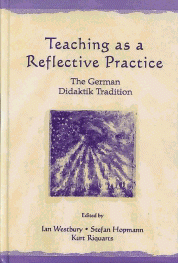| Preface
|
| |
| INTRODUCTION |
| |
Starting a Dialogue: A Beginning Conversation Between Didaktik and the Curriculum Traditions
Stefan Hopmann and Kurt Riquarts |
| |
| PART I: DIDAKTIK AS A REFLECTIVE PRACTICE
|
| 1. |
Teaching as a Reflective Practice: What Might Didaktik Teach Curriculum?
Ian Westbury |
| 2. |
German Didaktik: Models of Re-presentation, of Intercourse, and of Experience
Rudolf Künzli |
| |
| PART II: BILDUNG: DIDAKTIK'S CENTRAL IDEA |
| 3. |
Theory of Bildung
Wilhelm von Humboldt |
| 4. |
On Wilhelm von Humboldt's Theory of Bildung
Christoph Lüth |
| 5. |
The Significance of Classical Theories of Bildung for a Contemporary Concept of Allgemeinbildung
Wolfgang Klafki |
| |
| PART III: SOURCES FROM THE DIDAKTIK TRADITION |
| 6. |
Didaktik as a Theory of Education
Erich Weniger |
| 7. |
The Art of Lesson Preparation
Heinrich Roth |
| 8. |
Didaktik Analysis as the Core of Preparation of Instruction
Wolfgang Klafki
|
| 9. |
Teaching to Understand: On the Concept of the Exemplary in Teaching
Martin Wagenschein |
| 10. |
Content: Still in Question
Peter Menck
|
| |
| PART IV: DIDAKTIK AS PRAXIS |
| 11. |
Klafki's Model of Didaktik Analysis and Lesson Planning in Teacher Education
Stefan Hopmann |
| 12. |
Levels of Classroom Preparation
Gotthilf Gerhard Hiller |
| 13. |
Oral and Written Communication for Promoting Mathematical Understanding: Teaching Examples From Grade 3
Christiane Senn-Fennell |
| 14. |
Reflecting as a Didaktik Construction: Speaking About Mathematics in the Mathematics Classroom
Michael Neubrand |
| 15. |
Aspects of Simplification in Mathematics Teaching
Arnold Kirsch |
| 16. |
The Law of Free Fall as an "Exemplary Theme" for the Mathematicizability of Certain Natural Processes
Martin Wagenschein |
| 17. |
Open Experimenting: A Framework for Structuring Science Teaching and Learning
Peter Reinhold |
| 18. |
Klafki's Didaktik Analysis as a Conceptual Framework for Research on Teaching
Sigrun Gudmundsdottir, Anne Reinertsen, and Nils P. Nordtømme |
| |
| Author Index
|
| Subject Index |
 Ian Westbury, Stefan Hopmann, Kurt Riquarts (Eds.)
Ian Westbury, Stefan Hopmann, Kurt Riquarts (Eds.) Ian Westbury, Stefan Hopmann, Kurt Riquarts (Eds.)
Ian Westbury, Stefan Hopmann, Kurt Riquarts (Eds.)